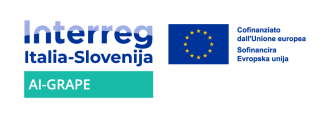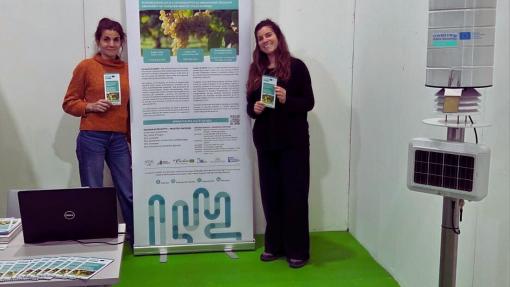The AI-GRAPE project was presented at the international R.I.V.E. – Rassegna Internazionale di Viticoltura ed Enologia, held from 5 to 7 November 2025 at the Pordenone Fiere exhibition centre in Italy.
This biennial event brings together the entire wine production chain – from vine to bottle – and showcases the latest technologies and innovations in viticulture and oenology. The fair is dedicated to professionals including winemakers, oenologists, producers of technological equipment, researchers, and innovators.
This year, R.I.V.E. hosted more than 250 exhibitors and over 350 brands, spread across seven exhibition halls and the outdoor demonstration area “Dynamic RIVE.” A special highlight of the fair was the Premio R.I.V.E. awards, which celebrate innovation in viticulture and oenology and promote the development of advanced and sustainable solutions in the sector.
For AI-GRAPE, participation in the fair was an opportunity to present our achievements and share project results with the international professional community. Visitors learned how AI-GRAPE applies artificial intelligence (AI) to promote sustainable viticulture, with a focus on digital solutions for monitoring grapevine diseases caused by pests.
It is particularly important that innovative approaches in viticulture, designed to tackle the challenges of integrating advanced technologies for disease management, complement the achievements of the SUSGRAPE project. AI-GRAPE focuses on vine diseases caused by insects and introduces decision-making models based on AI. Effective management of these diseases is essential for winegrowers, as it significantly impacts yield and quality while reducing pesticide use.
The key added value and innovation of the project lie in integrating diverse data through AI to create accurate predictive models. Advanced technologies such as machine learning and big data analysis enable the prediction of pests and diseases, allowing winegrowers to respond quickly and effectively.
Expected results include a 20% reduction in pesticide use, a 15% increase in vineyard yields, and a 10% decrease in losses caused by pest infestations. These outcomes will enhance environmental awareness among winegrowers, increase the adoption of sustainable agricultural practices, and strengthen trust in digitalisation processes within viticulture. The AI-GRAPE project thus represents a significant step toward sustainability, the conservation of natural resources, and the protection of consumer health through more nature-friendly cultivation methods.
The project presentation at R.I.V.E. was coordinated by project partner Primo Principio, who oversaw the dissemination of AI-GRAPE’s goals, results, and innovative approaches to the professional audience

